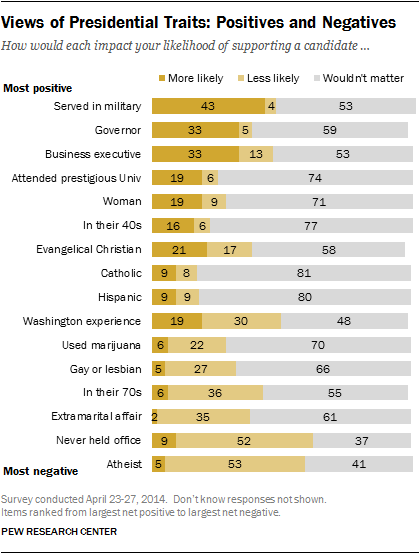The weekly report on research in secular demographics
by Julie Esris
 This week, an op-ed piece in The Washington Post openly speculated about the possibility of atheists running for US president, reminding atheists of a harsh reality: they are the least trusted group in America. Many surveys indicate that more than half of Americans would not vote for an atheist presidential candidate. A 2014 Pew poll sought to find out what Americans think the most desirable qualities are in a candidate and how these qualities would impact their voting decisions. The poll indicates that Americans would be most likely to vote for a presidential candidate if he (or she) has military service (43%), once served as a governor (33%), has been a business executive (33%), attended a prestigious university (19%), or is a woman (19%).
This week, an op-ed piece in The Washington Post openly speculated about the possibility of atheists running for US president, reminding atheists of a harsh reality: they are the least trusted group in America. Many surveys indicate that more than half of Americans would not vote for an atheist presidential candidate. A 2014 Pew poll sought to find out what Americans think the most desirable qualities are in a candidate and how these qualities would impact their voting decisions. The poll indicates that Americans would be most likely to vote for a presidential candidate if he (or she) has military service (43%), once served as a governor (33%), has been a business executive (33%), attended a prestigious university (19%), or is a woman (19%).
Although all of these numbers are below 50%, it is important to realize that this is due to more people declaring that these qualities would not┬áimpact their voting decision┬áone way or another. Only a small percentage said that these qualities would make them less likely to vote for the candidate (4% if he or she served in military, 5% if he or she served as a governor, 13% if he or she has been a business executive, 6% if he or she attended a prestigious university, and 9% if the candidate is a woman). In contrast,┬áa whopping 53%┬ásaid the candidate’s atheism would negatively impact their┬ávoting decision. Only┬á5% of respondents said they would be more likely to vote for a presidential candidate who was an atheist.
Why should┬áit be so difficult for an atheist candidate to get elected? Because many see the fact that atheists don’t inherently subscribe to a particular ideology as a problem. There is a popular misconception that without religion to guide them, atheists lack a moral compass, making them untrustworthy. Former president George H. W. Bush once commented that he does┬ánot consider atheists American citizens. Given these perceptions of atheists, is there any hope that this could ever change? Is it possible that┬ásomeday an atheist candidate could get elected as President of the United States?
Perhaps. While appalling, the statistics regarding distrust of atheists┬áonly tell part of the story. 62% of respondents of one┬ápoll┬áindicated that they would prefer that presidential candidates not use religion to make policy decisions. And the 2014 Pew poll that┬áindicated that 53% of Americans would not have voted for an atheist┬ácame only 7 years after a┬á┬á2007 poll that indicated the percentage┬áof Americans who say they would not vote for atheists was even higher: 63%. In 2007, 32% of those polled said that a candidate’s non-belief did not matter to them one way or another; in 2014, 41% of voters responded in kind. These are substantial changes in less than a decade – and they are trending in atheists’ favor.
So while┬áit is true that atheists are still the least trusted group in America, it is clear that this mistrust is beginning to decline. Much of this movement towards acceptance of secularism can be attributed to the works┬áof famous atheists such as Richard Dawkins, Christopher Hitchens, and Daniel Dennett, that have helped the public understand what atheism is and that atheists are more common than many people realize. Perhaps even more can also be attributed to the massive “coming out” of secularists in recent years, which has reduced much of the us-them mindset surrounding atheists.
Whatever the cause, these seemingly small personal changes have had a big impact on public policy and social trends in nations around the world. Many countries are becoming increasingly secularized, or at least more accepting of atheists. South Korea, which has a huge Christian population, has elected an atheist president. Even Uruguay and Chile, historically Catholic countries, have also elected atheist presidents.  It is becoming clear that America is headed in a similar, more secular direction.
